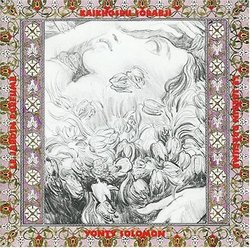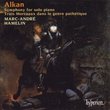| All Artists: Kaikhosru Sorabji, Yonty Solomon Title: Sorabji: Le Jardin Parfume Members Wishing: 1 Total Copies: 0 Label: Altarus Release Date: 7/19/1994 Genre: Classical Style: Number of Discs: 1 SwapaCD Credits: 1 UPC: 076958703720 |
Search - Kaikhosru Sorabji, Yonty Solomon :: Sorabji: Le Jardin Parfume
 | Kaikhosru Sorabji, Yonty Solomon Sorabji: Le Jardin Parfume Genre: Classical
|
Larger Image |
CD DetailsSimilar CDs |
CD ReviewsSolomon's Le jardin parfume Alscribji | Washington, D.C. | 04/15/2006 (5 out of 5 stars) "Kaikhosru Shapurji Sorabji composed some of the most chromatically filigreed, ornamental, languid, lush, voluptous and imaginative works for piano. Le jardin parfume is a beautiful example along with Gulistan, Djami, and Count Tasca's Garden (2nd movement of 4th sonata). The music is difficult to categorize and does not lend itself to easy pigeon holing (as is SO often done in music, whether pop or classical). The adjectives that come to mind upon listening to Le jardin parfume would be starry, misty, meditative, whirly, cascading, and exotic. There are only two recorded versions of this piece, Solomon's and Michael Habermann's. One reviewer remarked below that the music at times could have been played faster to create tension. You find that kind of interpretation in Habermann. However, Solomon's more reposed performance brings out the true fantasy of the piece. Whereas Habermann's clocks in at 19'05, Solomon's clocks in at around 26'00, much slower. In my opinion, this allows the listener to better appreciate the soundscapes that Sorabji creates with this music; playing it too fast is akin to rushing through a botanical garden without taking the time for the impressions that a much slower stroll would make upon the senses. One wonders why Solomon has not recorded anymore of the Sorabji repertoire; he has such capable hands for this highly original and extraordinarily unique piano music." Complex and meditative beauty Feral Puma | Northern California, USA | 12/19/2009 (5 out of 5 stars) "This CD is one of the jewels in my piano music collection. I guess if I had to compare it to something I'd have to say it is vaguely similar to Debussy's more dreamish works for piano, with a milligram of jazz added. Sorabji's music style sounds very improvisational, yet it makes coherent sense overall. In my opinion this is the best piece that Sorabji ever wrote, don't expect something epic like Beethoven's fifth symphony though. Here is just the song of the simple, meditative wanderings from a glass half-full of red wine, sitting on top of a moonlit steinway, Le Jardin Parfume is a deep midnight contemplation." A TONE POEM LIKE NO OTHER TONE POEM David Keymer | Modesto CA | 02/28/2010 (5 out of 5 stars) "At twenty-six minutes, this is just about the shortest-playing CD I own, but it's worth it. I had never heard of the English-born, Punjabi-descent modernist composer Kaikhoshru Sorabji until, one day, I came across his name surfing Amazon.com's website. I purchased pianist Fredrik Ullen's performance of the first twenty-five of Sorabji's 100 Transcendental Studies for Piano and loved it. So why not? Another Sorabji? Sure.
Le Jardin Parfume' is an extended tone picture. It`s not programmatical in nature -there are no imitated sounds of nature, for instance-- but musical -I hesitate to say `melodic' because the piece hints at melody more than develops any coherent melodical motifs. Rather, Jardin is all slow swirling chords, scales, with trills and fragments of melody scattered across the top of it. The melodic scatterings on top of the chordal base vaguely and seditiously undercut the tonal feeling of the base so that the piece feels as if it's almost tonally anchored but it's drifting off of its chordal base to .... Somewhere, I've run out of ways to describe it. The truth seems to be that Sorabji isn't like any other composer, so his pieces aren't like anyone else's either. This is not to say that there are no affinities, but they are affinities of the listener, not the composer. If the listener appreciates Debussy or some of Messiaen's more meditative pieces, he will probably appreciate this recording. I know I did. This is superior music, just a bit outside the canon." |

 Track Listings (1) - Disc #1
Track Listings (1) - Disc #1



